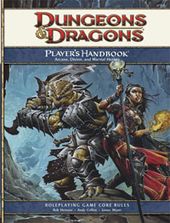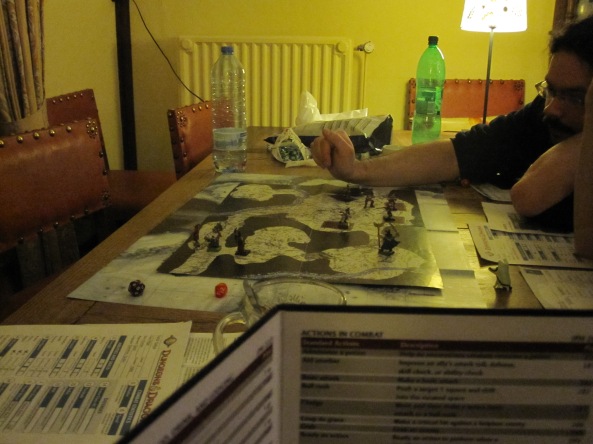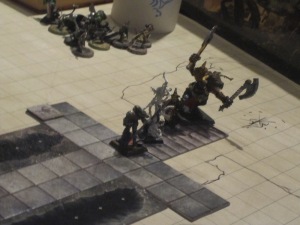I’ve been playing roleplaying games mostly as a DM (or GM, depending on the system) for about twenty years. In that time, I’ve played and/or run the following games:
 Het Oog des Meesters (Dutch translation of the German Das Schwarze Auge)
Het Oog des Meesters (Dutch translation of the German Das Schwarze Auge)- World of Darkness
- Star Wars D6
- Star Wars D20
- Star Wars Saga Edition
- Star Wars: Force and Destiny
- Warhammer Fantasy Roleplay 2nd edition
- Warhammer Fantasy Roleplay 3rd edition
- Dungeons & Dragons 3rd edition
- Dungeons & Dragons 4th edition
- 13th Age
And out of all of those systems, Dungeons & Dragons 4th edition is in my top three, right after Warhammer Fantasy Roleplay and the new Star Wars RPG by Fantasy Flight Games. Yes, once more, my preference goes to the one that got the most hate thrown at it (see my view on the Star Wars prequels). And once more, I want to stress I don’t mean to be contrarian for its own sake – I have reasons for my opinions.
I have read 5th edition and I’ve been very impressed with how the game was streamlined to make it less complicated while still allowing for lots of options in character builds. I also think the books for 5th edition are much more beautiful, with far better artwork and graphical design than 4th edition manuals had. Despite that, I still intend to stick with 4th edition for now, and I love how it actually plays. Here’s why.
What I want from an RPG
Before I explain why I think D&D 4e is great, I think it’s necessary to point out what I expect from a tabletop RPG, as your preferences may differ.
For me, a roleplaying game is equal parts roleplaying and game, but I do tend to keep those two somewhat separate.
An RPG is not a simulation, and therefore I’m not too concerned about ‘realism’. Game systems that rely heavily on complex rules that can ‘correctly’ simulate all kinds of situations don’t appeal to me at all. As a DM, I’d rather just wing it than look up how long a character can hang upside down before getting a brain aneurysm or something.

One of our games in progress
It’s a game, and therefore it needs to be fun above all. For that reason, I prefer not having too many complicated rules that you need to remember all the time.
As for the roleplaying part, I think it’s most fun when the players and the DM can just act out and narrate the events freely with an occasional dice roll thrown in here and there. I certainly don’t want the roleplaying part to be bogged down by any rules. Of course, you do need some rules, to set limits to what can happen, to make a character’s build (skills, talents, what have you) matter at least a little bit outside of combat, and to add an element of unpredictability to the story for everyone involved (including the DM). But on the whole, I like the roleplay side of things to be as rules-light as possible.
Combat should be the where the game part really shines, and therefore it should be at the heart of the rules system. Outside of combat, the immersive storytelling experience should be what matters most, but as soon as the players roll for initiative, they should get into a ‘gamey’ mindset. This is because combat rules are usually complex, and I don’t want to learn all those rules for something that is really just a simulation of ‘how a combat would play out’. If that is the only purpose of a fight scene, I’d rather ditch combat rules altogether and just wing it with a few skill checks. Complicated rules can be great however, if you use them for the purpose of having a fun, tense, exciting and unpredictable experience. And that means that strategy and tactics have to be important.
I love playing with miniatures and battlemaps, mostly for the visual appeal (and the fun of painting the minis) but also because they make combat scenarios so much clearer for everyone involved.
The game should be easy to get into. This means that character creation, levelling up and DM’ing should be easy to do. Simultaneously, I like having lots of options at my disposal, both as a player and as a DM. Having both of these advantages can be difficult, as more options automatically means more complications. Thankfully, computer software can be a great tool to meet these challenges. Character builder and encounter builder software is a fantastic tool that still far too few RPG developers make us of.
Lastly, I like the setting to be wildly imaginative and have a distinct personality, but simultaneously I want it to give me as much freedom as possible to come up with my own history, towns, nobility, dungeons and the like.
Why I like 4e
4th edition D&D met all of these requirements for me. Outside of combat, it relies on little more than a fairly short list of skills that pretty much covers most situations. There are also some rules for magic rituals and utility powers, which are pretty light and easy to get into.
Within combat, the system suddenly turns into a very well thought-out, balanced strategic action game. It completely embraces miniatures wholeheartedly, and because of that, tactical aspects of the combat environment, such as range, location, cover, and the like, become highly important. This makes for the possibility of having very fun fights with characters moving around and using the scenery to their advantage.
In addition, 4e is unapologetic about its video game-like take on classes: each class is there to fulfil a combat role, and I for one welcome that, because it makes every player focused on what their character is good at, and that automatically encourages very varied playstyles, which is especially good when you are playing with beginners.
I also really like the powers system. Giving every character a set of abilities that they can either use at-will, once per encounter or daily, was a fantastic idea in my opinion. No longer are fighters limited to simple attacks while wizards have tons of cool spells at their disposal. I know that there are downsides to the system (the game can slow down a lot when players are looking through their options each round) but I think the trade-off is worth it.
 A lot of people disliked 4th edition because they felt it just wasn’t D&D anymore. One of the reasons they felt this way was the change from Vancian casting to the powers system. Vancian casting is a name that I think is based on the novels of Jack Vance, but I’m not sure. What it means in practice is that wizards get a number of spells per day. Out of their repertoire of spells, they have to choose a few to memorize before they go to sleep and those are the spells they can then cast for the following day. Not only does this strike me as unrealistic, I also think it’s too limiting. Once the wizard has cast all his spells for the day, his character basically becomes useless until the party stops for a rest. I know that 5th edition made a return to Vancian casting but amended the problem by giving wizards access to a number of less powerful at-will spells, too. How well that works, I don’t know, because I haven’t played 5e yet, but the solution borrows heavily from 4e. What I like still more about the 4e, though, is the fact that there is absolutely no Vancian casting, and that wizard spells function exactly like all other powers, with at-will, encounter and daily varieties. I like the uniformity of that. It feels more elegant to me, making wizards feel less like this completely separate breed of hero and more like a member of the team.
A lot of people disliked 4th edition because they felt it just wasn’t D&D anymore. One of the reasons they felt this way was the change from Vancian casting to the powers system. Vancian casting is a name that I think is based on the novels of Jack Vance, but I’m not sure. What it means in practice is that wizards get a number of spells per day. Out of their repertoire of spells, they have to choose a few to memorize before they go to sleep and those are the spells they can then cast for the following day. Not only does this strike me as unrealistic, I also think it’s too limiting. Once the wizard has cast all his spells for the day, his character basically becomes useless until the party stops for a rest. I know that 5th edition made a return to Vancian casting but amended the problem by giving wizards access to a number of less powerful at-will spells, too. How well that works, I don’t know, because I haven’t played 5e yet, but the solution borrows heavily from 4e. What I like still more about the 4e, though, is the fact that there is absolutely no Vancian casting, and that wizard spells function exactly like all other powers, with at-will, encounter and daily varieties. I like the uniformity of that. It feels more elegant to me, making wizards feel less like this completely separate breed of hero and more like a member of the team.
 Apart from the rules, I love how 4e approached its setting. The ‘points of light’ setting was a great idea because it offered precisely what a DM needs and not more. You have your deities, your races, your peoples, your general tone and feel, and everything else is pretty much entirely open for the DM to imagine for himself. That’s all I really need. There is enough raw material to start imagining my own reasons why there is a dungeon next to a town, or how a city came to be located on a floating island.
Apart from the rules, I love how 4e approached its setting. The ‘points of light’ setting was a great idea because it offered precisely what a DM needs and not more. You have your deities, your races, your peoples, your general tone and feel, and everything else is pretty much entirely open for the DM to imagine for himself. That’s all I really need. There is enough raw material to start imagining my own reasons why there is a dungeon next to a town, or how a city came to be located on a floating island.
Finally, there is the character building and the support for dungeon masters. If you just used the books, character creation in D&D 4e was a complex and painstaking process. With the character builder software, however, you could make a perfectly good character in three minutes. It was an amazing tool for players. Levelling up was equally made easy by this tool. The software also had a component for the DM, providing adjustable stats for every conceivable monster, as well as an easy way to create encounters suited for the party’s level. The only downside of this software is that eventually Wizards of the Coast decided to make it work exclusively online within a browser. Today, that means it’s pretty much no longer accessible. Only the old offline character builder can still be downloaded, and I highly recommend anyone interested in the game to look it up.
The flaws of 4e
 If the design philosophy behind 4th edition doesn’t appeal to you, then it would be pointless to try it out anyway. The game has very clear goals and if those aren’t what you’re looking for, you should stick with another edition or another game entirely. This is definitely not a game for people who like a more simulationist approach to RPGs, nor for those who prefer more attention to non-combat rules or who simply want the game to be as light and quick as possible.
If the design philosophy behind 4th edition doesn’t appeal to you, then it would be pointless to try it out anyway. The game has very clear goals and if those aren’t what you’re looking for, you should stick with another edition or another game entirely. This is definitely not a game for people who like a more simulationist approach to RPGs, nor for those who prefer more attention to non-combat rules or who simply want the game to be as light and quick as possible.
That said, within its design goals, D&D 4e did have one major flaw as well, and it’s been discussed at length by lots of people: combat could take really, really long, especially at higher levels. This is partly due to the tactical nature of the game and the large amounts of options to choose from every turn, but partly it’s also a result of the high amounts of hit points. Fans have tried to amend this by giving monsters lower hit point amounts and greater damage, but in my experience if you fiddle with the core rules, the game experience always suffers from that. The developers did address this problem when they made the (excellent!) expansion The Monster Vault, which contained lots and lots of monsters with some adjusted stats. Another possible solution is simply keeping it in mind as a DM when you design your encounters. Use lots of minions and stay away from soldiers. Still, it’s a flaw in the game.
A related issue with 4th edition might be considered more of a feature by some, and more of a bug by others. The design of the combat system brings lots of situational modifiers with it. A +2 bonus here, a -2 penalty there. Some are the effects of using certain powers and feats, others come from the environment (cover, difficult terrain, what have you). In any case, a single roll of the dice might be modified several times over, which can get complicated and take up your time. Additionally, it’s easy to forget these modifiers. It seems like 5th edition really addressed this very well, streamlining the game a lot in that regard. I personally kind of like all of those modifiers as they do add something to the game, but they can get out of hand sometimes.

Conclusion
In my opinion, Dungeons & Dragons 4th edition is not a perfect game, but it’s a game with a vision, with guts and with some really cool ideas. I also simply like what it tries to do a lot. Some will say it strays too far from the core idea of what D&D is, but to be honest, this is actually the only version that I have really enjoyed so far (I haven’t played 5th edition yet, but I didn’t like 3rd edition). Some will say 4th edition is simply a tactical skirmish game, but I disagree. The framework is clearly that of an RPG, even if some will find that framework a bit too light. All in all, it’s an excellent platform for endless tabletop adventures and I will gladly run more of those in the future using the 4th edition ruleset.


Fun to read. My only experience with D&D is of the 5th edition. I started to play it a year ago with a few friends, one of which was an experienced player/DM. I really enjoy it, but mostly because of all the fun interactions… and being a fighter, I do love the fighting.
But I do not enjoy seeing that a wizard or druid can have some awesome spells (at level 4) … but I only have a few attacks… but I AM A FIGHTERRRR ^^
So I still can’t wait to level up to some higher levels, to have some more options.
(and btw… are you Dutch?)
Thanks for your feedback 🙂
I’m Belgian, actually, so quite close 🙂 What gave it away?
oh, right, het oog des meesters… Duh 🙂
l still play 4e too ,it’s a great and innovative rpg
As someone for whom 4e remains my preferred edition, you hit the nail on the head. The one thing I’d add is about how people talk about length of running combat. I’ve noticed 5e fans, in particular, praise the short combats as if a fight is an unpleasantness to get through as quickly as possible. Which is great if that’s what you’re into, but it doesn’t mean they’re equally exciting. I don’t mind 30 minute combats if they’re exciting, cinematic, and tactically complex. Previous editions didn’t do it smoothly and 5e doesn’t much bother to try.
It’s great to know that there are fans out there. I played most of the earlier editions, back to the original Red Box, and none of them ever quite did what I expected or wanted. I’ll admit that this was due in part to my misunderstanding of what the game was really after, but I don’t think I’m alone in that, and I think the game could have been clearer back then.
In any case, yeah, 4th Edition really works for me. I like the clear roles, and how well balanced the classes and races are. The vast majority of the game just /works/ without having to hunt for /how/ it works or have the DM just decide on their own.
I understand the separation into “roleplaying” and “combat,” but I actually like 4th Edition for the fact that it doesn’t really require that much separation. It’s the only edition of D&D I’m aware of that ever bothered trying to set clear rules for handling non-combat challenges. Even though the skill challenge systems was widely reviled, it at least gave me /something/ to work with and that has really helped me.
I think the “long combat problem” is easily dealt with, mostly by relaxing. People get gamey and focused because they want to make sure they get everything, because failing to do so could cost someone (or everyone) their characters. Focusing more on other ways to fail (loss of an important NPC, failure to obtain a particular item, failure to complete a skill challenge) can make failure less biting, and pave the way for more handwaving during combat. In other words, it’s not necessary for combat to hinge on reducing every member of the others side to 0 HP.
Anyway, glad to hear the positive words about my favorite edition. I hope the fans stick with it. Maybe it will make a comeback someday….
One of the most original editions with a flavor of its own, really working rules for at least the first 15 levels and a special era of the Forgotten Realms to focus.
To me 4th edition D&D is not the best edition of D&D, its a better fantasy strategic RPG game than D&D ever was or perhaps will be.
It provides the best use out of all gaming aids , miniatures, tiles , power cards ,character generators and if you got the imagination its also great for storytelling.
It binds all of the above to an organized whole.
Now that it is out of print , feels even more complete coherent and timeless.
A classic for those able to appreciate true game design.